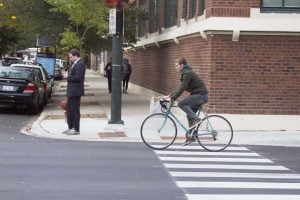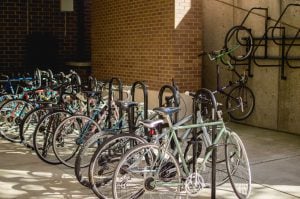
As the third largest city in the nation, Chicago is a busy city. According to the City of Chicago website, about 882,430 vehicles pass through Chicago on an average weekday. This has caused safety to become a serious problem for campus bikers, especially for bikers in the Loop Campus, which is one of the busiest campuses located downtown.
Mallory Ewart, a senior American studies student at DePaul, has been biking on campus for three years.
“People feel very insecure about riding a bike on campus, especially in the Loop,” Ewart said. “It’s super busy here.”
But Ewart said it would not be a problem if people could figure out how traffic worked. “That’s the key to riding a bike,” she said.
Wearing a helmet is also a good way to protect yourself. Ewart said she once fell off her bike, but luckily her helmet protected her from sustaining a severe head injury.
Phil Marcinek, assistant director of facilities at the Ray Meyer Fitness Center, also had the same concerns about safety.
“People should learn the rules of the road, and make sure you are paying attention,” he said. Sticking with the bike paths is important. “Even though a lot of streets don’t have bike lanes, cars realize that there are bikes everywhere, so they are going to give you a little bit more ground,” he said.
Although safety is a big problem for many bikers, Ewart has other concerns about the unfriendly relationship between bikers and drivers.
“Most of the time bikers know exactly what they are doing. They understand that they are not going to get in the way of these cars at all,” she said. “But the cars don’t understand that. The cars don’t realize that we are just humans.”
Ewart said some drivers are inconsiderate when it comes to sharing the road. It happened to her many times.
She was riding a bike in Lincoln Park one night with her friend. It was quite late, and the road wasn’t busy at all. Then a car came up to them, and people yelled “Get the f— out of the road.” Ewart said she just didn’t understand.
“I mean, you have so much room. You are in the car, and you can destroy us,” she said. “Just give us some space.”
The same thing happened when she was stopped at a stop sign. Then the cars just skirted along. She said it just felt like the drivers were saying, “Don’t get in my way, you are making me stop right now.”
“Go and do your own thing,” she said. “Let us do our own thing as well.”
Ewart said biking is still worth a shot.
“Instead of being mean back to cars, just say something like ‘Have a nice day.’ Just something foolish.” she said.

Campus spots to gear up
Sitting on the bench outside of the Barnes & Noble at the DePaul Center, Mallory Ewart was reading her book. Her brown bike leaned against the bench, bathed in the late afternoon sun.
“I love biking around,” Ewart said. “I feel more active to the city, and I get to discover a lot more of the city.”
It’s true — Chicago is a good place for bikers. According to Bicycling magazine, Chicago is ranked as the No. 2 bicycle-friendly city in the United States. DePaul University, with two campuses located in Chicago, has done its bit to create a bike-friendly campus.
According to the website of the DePaul Facility Operations Department, biking to and around campus has become a friendlier activity since increasing the number of bike parking spaces to just under 1,000 in 2013.
John Washo, senior assistant director of Outdoor Recreation at the Ray Meyer Fitness Center, said DePaul has done a very nice job of both encouraging and increasing opportunities for biking on campus.
“We have seen a growth in bike stalls that afford more individuals the option of biking to campus,” Washo said.
According to Washo, several new stalls were installed around the campus during the summer, including two brand-new ones outside of the Ray.
DePaul students and staff can always turn to the Campus Recreation Department for any bike-related activities. According to Marcinek, the center offers rental bikes at just $7 for the day. It also offers a series of bike workshops, such as the Bike Maintenance & Safety Workshop, Lakefront Bike Cruise and City Biking Intro.
“We want everyone at DePaul to have the chance to ride on campus,” Marcinek said.


BTD • Oct 13, 2014 at 8:16 am
I deeply disagree with the comment by Ewart, “Most of the time bikers know exactly what they are doing. They understand that they are not going to get in the way of these cars at all,” she said. “But the cars don’t understand that. The cars don’t realize that we are just humans.”.
Cars in general follow the a uniform set of rules. Partly because they all learned the same set when they learned to drive and partly to avoid tickets and accidents. Each and every cyclist follows their own set of rules. Where as you can predict what a car will do in most situations there is little to no way to predict what a cyclist will do at a stop sign, stop light, turn from whatever lane they may happen to be in, etc.
Cars get the blame in most instances. Remember that bike lanes end at stop signs and lights. There will bikes to the left, right, on the sidewalk, splitting lanes, pulling up on the right of a car car with it’s right turn signal on to go straight and lots more, all at the same stop light.
Until cyclists can maintain some form of uniformity there will be problems.